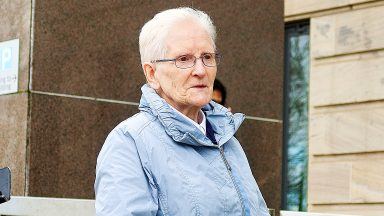Premenstrual Dysphoric Disorder (PMDD) wasn’t officially recognised as a mental health disorder until 2013 – but it can affect around one in 20 women.
PMDD is a severe form of premenstrual syndrome that causes extreme mood swings, depression and anxiety before a period due to hormone changes.
According to research, the condition affects around one in 20 women – of those, one in three attempt suicide, and half self-harm.
Dr Lynsay Matthews, based at the University of the West of Scotland, has been involved in leading the UK’s first research agenda for PMDD.
It wasn’t officially recognised as a mental health disorder until 2013 – meaning research around the condition is still in the early phases.
She told STV News: “In the monthly menstrual cycle, we have these wild fluctuations that happen every two, three and four weeks, so people have these strong reactions that result in significant emotional disturbance, suicidality, feelings of self-harm and lots of other confusing symptoms, which then disappear when their period begins.
“We’re very, very much at the early stages of fully understanding what the causes are.”
‘I’d rather have physical than emotional pain now’
Lynne Cuthbertson says she was left in the dark about her mental illness for over 20 years before being officially diagnosed with PMDD eight years ago – something she’d never even heard of before.
The 49-year-old had been told to keep a diary of how she was feeling whilst tracking her menstrual cycle.
Lynne said: “In my early 20s is when I would say things were really quite bad.
“My moods would be up and down, and I would phone the doctors when I was feeling really poorly, really anxious and just not feeling myself and then by the time I would get the appointment with the doctors the next week, I would be alright again.”
Now Lynne is recovering from a hysterectomy after deciding to undergo surgery to help relieve some of her symptoms.
She said: “It was so good to get a diagnosis at that point, but I didn’t think I’d have to wait this long to have a resolution to it.
“I had to phone up gynaecology on one of my worst days where I really did feel quite suicidal, and that’s when I got fast-tracked.
“I’d rather have physical than emotional pain at this point.
“My life has been, not completely ruined – I’ve got my boys, and I’ve got a supportive family – but I just feel that I don’t want to see other women or other teenagers having to go through and not knowing what’s going on with them.
“There are so many young women that are going around feeling suicidal because of it, so there does need to be more education around PMDD in schools, with GPs and a more specialised approach.”
Researchers like Dr Matthews say they’d like to see PMDD more widely recognised in Scottish Government health strategies.
Women’s health minister Jenni Minto added: “I recognise that Dr Matthews has done a huge amount of research in her work, and she will be meeting with members of the Scottish Government so that they can update to ensure that the next iteration of the women’s health plan, which we’re working on just now, actually has good coverage of menstrual health, including PMDD.”
Help and support is available now if you need it. The Samaritans can be contacted any time, from any phone, free on 116 123, email at jo@samaritans.org, or visit samaritans.org to find your nearest branch. Details of other services and more information can be found on the NHS website here.
Follow STV News on WhatsApp
Scan the QR code on your mobile device for all the latest news from around the country




























